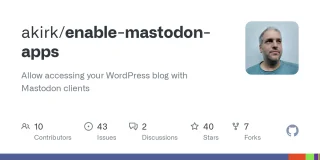
Unterhaltsamer Abend beim Live-Podcast von Haken dran mit Nora Hespers, Dennis Horn & Gavin Karlmeier, Nutzungsbedingungen und Emotionen, Dieter Bohlen, Andrea Kiewel und Guildo Horn. What. 🕴️
Das Weblog von Stefan Grund, der im Netz als @eay unterwegs ist und hier seit 2003 über Medien, Popkultur und Technologie schreibt. Mehr »

Unterhaltsamer Abend beim Live-Podcast von Haken dran mit Nora Hespers, Dennis Horn & Gavin Karlmeier, Nutzungsbedingungen und Emotionen, Dieter Bohlen, Andrea Kiewel und Guildo Horn. What. 🕴️
Bleiben wir beim Microblogging1: Roland über Openvibe, eine iOS- und Android-App, die ich dieser Tage auch gerne nutze und empfehle. Neben dem Crossposting und der erwähnten, schick gelösten Crossmention unterscheidet sich Openvibe aber von anderen Crossposting-Tools wie dem hervorragend betitelten Croissant dadurch, dass es eben auch alle Timelines/Feeds von Mastodon, Bluesky und Nostr darstellt und sogar in einer Unified Timeline vereint (Threads ist aus ewig gestrigen API-Beschneidungsgründen nur beim Posten verfügbar).

Kennt ihr schon den großartigen Crossposting-Client Openvibe?
Sill connects to your Bluesky and Mastodon accounts and gathers all of the links posted to your timeline. Then, Sill aggregates those links to show you the most popular links in your network.
(via iPhoneBlog)
⁂ is a typographical character, not an icon that needs to be inserted as an image. Unique-looking, but standardised. This means it’s very easy to copy-paste around! […]
⁂ is called an asterism. In astronomy, it refers to groups of stars in the sky, akin to constellations. We suggest that it’s a very fitting symbol for the fediverse, a galaxy of interconnected spaces which is decentralised and has an astronomically-themed name. It represents several stars coming together, connecting but each their own, without a centre.
Nice idea. I just followed @liaizon’s example and set the iOS/macOS text replacement feature to expand *** into ⁂.
Allow accessing your WordPress with Mastodon clients. Just enter your own blog URL as your instance.
Spannendes Projekt von Alex Kirk, von dem Matthias Pfefferle hier berichtet, das die Steuerung der eigenen WordPress-Installation per Mastodon-Client à la Ivory, Mona, Mammoth & Co. ermöglicht. Idealerweise im Zusammenspiel mit Matthias‘ ActivityPub-Plugin, sowie dem mir bis dato unbekannten Alex‘ Friends-Plugin, wodurch WordPress quasi zu einer eigenen, kleinen Mastodon-Instanz samt App-Anbindung wird.
Eines der Probleme von WordPress, aber auch anderen Blog-CMS wie Ghost, ist ja die vergleichsweise hohe Publikationshürde. Während Twitter-ähnliche Experiences aus einer simplen Textbox bestehen, kommen Blogs in der Regel mit mindestens zwei Textfeldern daher (Titel und Text), Formatierungen, Kategorien, Tags und und und. Um mal eben unterwegs im eigenen Blog microzubloggen (oder einen Beitrag wie diesen zu posten), ist das relativ viel Overhead. Dass die WordPress-App, wie Herr Kowski zuletzt auch festgestellt hat, ein überladenes, auf WordPress.com zugeschnittenes Monster ist, macht die Sache nicht besser – ein Projekt wie das obige hilft diese Lücke zu füllen.
Selbst blogge ich schon seit Jahren exklusiv aus Drafts heraus, das mein WordPress-Blog über die API befüllt, aber ich hoffe, dass neue Social-Apps wie Project Tapestry, das ich selbstredend unterstützt habe, da in Zukunft zeigen, wie es besser gehen könnte.

Allow accessing your WordPress blog with Mastodon clients - akirk/enable-mastodon-apps
Terence Eden baut einen ActivityPub-Server in einer einzigen PHP-Datei und statt einer Datenbank, nutzt er JSON-Dateien zum Persistieren. Hier das Git-Repository, das auch auflistest, welche Features bereits bzw. noch nicht unterstützt werden.
In meiner Wunschvorstellung wird das Hosten einer eigenen ActivityPub-Instanz in Zukunft so einfach, wie das Hosten eines WordPress mit seiner berühmten „5 minute installation“. Damit – wie in meinem Use Case – eben nicht mehr eine ganze Mastodon-Instanz betrieben werden muss, sondern ein simples Single-User-System, das dann auch das Mastodon-Ökosysten an Apps & Services unterstützt. Interconnected mini social networks! (via Thomas)

Any computer program can be designed to run from a single file if you architect it wrong enough! I wanted to create the simplest possible Fediverse server which can be used as an educational tool to show how ActivityPub / Mastodon works. The design goals were: Upload a single PHP file to the ...
From Meta’s engineering blog. At least they continue to talk explicitly about ActivityPub and the Fediverse. However, no mention of the EU launch.
Our goal with Threads is to make social content as interoperable as email. We are working on the ability for Threads to integrate with ActivityPub, the open, decentralized social networking protocol.
My ultimate hope for Threads is that it becomes the zeitgeist of the internet.
(via Matt)

Earlier this year, a small team of engineers at Meta started working on an idea for a new app. It would have all the features people expect from a text-based conversations app, but with one very ke…
Nachdem ich bisher meine eigene „Blog → Mastodon“-Brücke genutzt habe, bin ich nun zu Jan Boddez’s hervorragendem „Share on Mastodon“-Plugin für WordPress gewechselt.
Was ich allerdings noch nicht hinbekommen habe, ist das Encoding. Das scheint aus mir unerfindlichen Gründen noch nicht so zu wollen, wie ich will…
Update, 50 Minuten später: Ok, got it.
SkyBridge is a magical server that translates Mastodon requests into Bluesky ones, allowing you to unlock the power of incredible Mastodon apps like Ivory and use them on the Bluesky network.
Made by videah. It’s work in progress, but already work great and allows you to post to Bluesky via Tapbots’ excellent Mastodon app Ivory, for example. 🤯
Maybe Mastodon app developers should incorporate something like this right into their apps to become universal, protocol agnostic microblogging clients.
In Anbetracht der bevorstehenden (oder auch nicht mehr bevorstehenden) API-Veränderungen bei Twitter habe ich meinen beliebten Twitter-Bot @fcnewsbot, der Neuigkeiten rund um den 1. FC Köln postet, zu einem echten Mastodon-Bot ausgebaut. Bisher wurden lediglich die Tweets rüber syndiziert, nun werden sie zusätzlich zu Twitter auch direkt zu Mastodon gepostet. Damit ist es komplett egal, was drüben bei Elmo passiert.
Im Zuge dessen habe ich dem “FC News Bot” auch einen neuen Avatar spendiert, der weniger Copyright Infringement und mehr Unterscheidbarkeit zum regulären FC-Account bietet. Microsofts hervorragendes, aber eingestelltes Fluent 3D-Emoji-Set macht’s möglich.
Ein großer Vorteil von Bots (und generell allen Accounts) auf Mastodon ist, dass es von Haus aus RSS-Feeds mit dazu gibt. D.h. auch ohne Mastodon-Interesse und -Account lässt sich dem Bot nun auch über eay.social/ @fcnewsbot.rss komfortabel folgen.
Das Beste: Da viele Feedreader-Apps mittlerweile auch ein paar Extraumdrehungen für Mastodon machen, gibt’s da ein paar Bonus-Features. Mein Feedreader-Service Feedbin hängt z.B. an Mastodon-Posts mit Links den verlinkten Artikel als Volltext an. Das bedeutet, dass ich nur mit dem Abo des fcnewsbot-Feeds direkt alle verlinkten Artikel aus den diversen Publikationen im Volltext innerhalb meines Feedreaders Reeder lesen kann. Und Klicks sparen, ist bekanntlich das oberste aller Gebote.

6.16K Posts, 1 Following, 155 Followers · Inoffizieller Bot, der auf aktuelle Neuigkeiten rund um den 1. FC Köln verweist. 👨🏻💻 Aufgesetzt vom #effzeh-Fan @eay@eay.social mit Unterstützung von @ayacoo@mastodon.social.